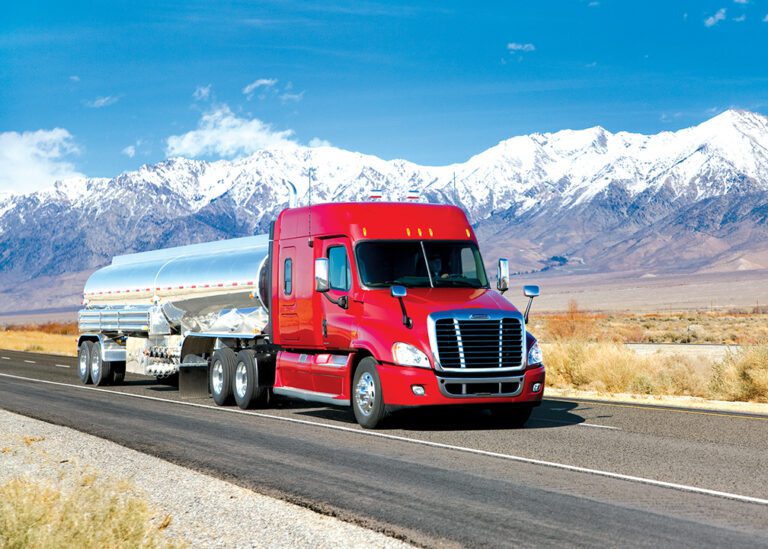U.S. sales of new Class 8 trucks got off to a great start in January, according to data received from Wards Intelligence.
Manufacturers reported January sales of 19,902 trucks, an increase of 33.1% over January 2022 sales of 14,957 trucks. It was the best January since 2019.
The January figure was down, of course, from December, which is typically the strongest sales month of any year. December 2022 saw truck sales of 29,214, so January represented a predictable sales decline of 31.9%.
Of the major OEMS, Freightliner still leads the way. The company was responsible for 47.3% of the new Class 8 trucks sold in January, according to Wards. Sales of 9,409 Freightliners were only 11.7% down from December’s 10,660, the closest of any of the manufacturers. Compared with January 2022, however, sales rose for Freightliner 44.4% from last year’s 6,514.
Volvo Trucks’ more modest 7.1% of January Class 8 U.S. sales came with an interesting twist. The company reported selling exactly one more truck in January 2023 than in the same month of 2022 for an increase of 0.1%. For the full year 2022, Volvo captured 10.6% of the market, so sales in the coming months should be picking up.
Volvo-owned Mack Truck saw the biggest drop of all the manufacturers from December sales. The company sold only 898 Class 8 trucks in January, down 59.4% from December’s 2,436.
Kenworth sales of 2,614 topped January 2022 sales of 2,218 by 17.9%. PACCAR sibling Peterbilt’s sales in January 2022 weren’t as robust, with 1,623 units moved then compared to 2,459 in January 2023. The result is an increase of 51.5%.
International Trucks reported sales of 2,459 in January, up 26.1% from 1,950 a year ago in January 2022.
Western Star remained steady with sales of 567 trucks, good for 2.8% of trucks sold in January. In January 2022, the company sold two fewer trucks than this year’s result.
While The Trucker generally focuses on sales of Class 8 vehicles in our monthly reports, drivers frequently see smaller trucks with familiar nameplates, so we’ll take a look at those numbers for 2022 as well. Freightliner sold 96,465 Class 8 trucks in 2022, along with 22,376 Class 7, 22,219 Class 6 and 3,594 Class 5 trucks. Class 8 trucks comprised 65.7% of total truck sales, Classes 5 and up.
International also supplies trucks of varying sizes to the market. Of International’s total 2022 sales of 61,867 trucks, 31,935 (51.6%) were of the Class 8 variety. The remainder were Class 7 (13,924), Class 6 (13,539), Class 5 (2,455) and Class 4 (14) trucks.
Of Kenworth’s total reported sales of 41,270, 89% (36,730) were Class 8, followed by 2,847 Class 7, 1,687 Class 6 and six Class 5 trucks. Peterbilt showed similar numbers, with 38,782 of total sales of 43,307 being Class 8 for a total of 89.5%, followed by 3,546 Class 7, 975 Class 6 and four Class 5 trucks.
Mack sales of 17,051 Class 8 trucks represented 78.3% of total truck sales. The remainder were 1,021 Class 7 and 3,692 Class 6 trucks sold.
Other manufacturers that no longer (or never did) manufacturer Class 8 trucks but do sell Class 5-7 vehicles include Ford, GMC, Hino and Isuzu, among a handful of smaller manufacturers.
With talk of recession in the news, pent-up demand for trucks should continue to push the market through at least the first half of the year. In a Feb. 13 release entitled “Best Recession Ever for Class 8 Trucking,” ACT Research reported North American orders for new
Class 8 trucks were still approaching the 250,000 mark, a number that would take manufacturers nearly eight months to build if no further orders were received.
Order cancellations might be expected to rise if the predicted recession impacts freight availability, but for now, carriers are still reporting profits and growing their fleets to take advantage of favorable pricing.
ACT President and Senior Analyst Kenny Vieth said this in the release: “While down year over year, the December-ending Class 8 backlog represents the fourth highest year-end backlog on record. With this as context, our call for strong production in 2023 is hardly a stretch. That said, we do expect softening, as lower freight volumes and rates, higher costs, improved equipment availability, and the gradual exhausting of pent-up demand begin to exert downward demand pressure.”
That softening, if it happens at all, should begin in the second half of the year.
ACT also reported that trailer orders remained strong in January, with a total 24,200 orders expected. Like sales of tractors, orders for trailers are already backed up about 10 months on the North American market.
One potential negative in the marketplace might be the increasing cost of credit. The Federal Reserve enacted seven increases in its federal funds rate range in 2022, including .75% increases in a row. Its first increase in 2023 was only .25%, but it pushed the target funds rate range to 4.5% to 4.74%. That’s the highest they’ve been since 2007. While signs of inflation seem to be slowing, if the FED doesn’t see the progress it wants, further rate increases may be coming.
Carriers who use credit to buy new equipment will see higher interest rates on loans, but high interest rates also impact the trucking industry in another way: Interest rates on home mortgages are also rising, possibly curtailing building of new homes. The same thing is happening for loans for new cars. Credit card interest rates are rising, too, impacting sales of durable goods like appliances. If sales are impacted to a great degree, there will be less of those products being shipped, which could impact both freight availability and rates to haul it.
Despite the headwinds, carriers are still buying trucks and trailers and ordering more. Whether the coming recession shuts it all down or is a temporary blip for the business will be revealed later this year.
Cliff Abbott is an experienced commercial vehicle driver and owner-operator who still holds a CDL in his home state of Alabama. In nearly 40 years in trucking, he’s been an instructor and trainer and has managed safety and recruiting operations for several carriers. Having never lost his love of the road, Cliff has written a book and hundreds of songs and has been writing for The Trucker for more than a decade.













